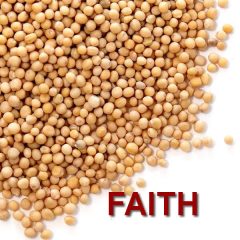faithful servant
Not How Much Faith, But Where It’s Planted

27th Sunday Ordinary Time – Year C
Fr. Joonbin Lim
Preached: October 5, 2025
In today’s Gospel, the apostles come to Jesus with a very human request: “Lord, increase our faith.” How often do we say the same?
We wish we had stronger faith, faith that would help us overcome doubt or difficulty. But Jesus gives a surprising answer: “If you have faith the size of a mustard seed, you could say to this mulberry tree, ‘Be uprooted and planted in the sea,’ and it would obey you.”
Faith, Jesus tells us, is not about quantity but authenticity. Even the smallest faith, if it is real and rooted in God, can do what seems impossible. What matters is not how much faith we think we have, but in whom our faith is planted.
When I hear this passage, I think of my own journey of faith. By nature, I am someone who relies more on reason than emotion. For years, I tried to understand God through study and reflection. But over time I realized — God cannot be fully understood by reason alone.
When people speak of “experiencing the Holy Spirit,” I find it hard to believe. I said, “Yes, I believe,” but deep inside I wasn’t sure. Faith was in my head, but it hadn’t yet reached my heart.
Before my priestly ordination, I went to Louisiana for an Ignatian silent retreat. There, during days of silence and prayer, I experienced the Holy Spirit in a deep and powerful way. It was not a vision or a voice, but a profound peace and joy that touched the core of my heart. I knew then that the Holy Spirit is real and alive, and that He works within us.
But how can we know if what we experience truly comes from the Holy Spirit? For that, we can turn to St. Ignatius of Loyola, who teaches us the discernment of spirits. He said that there are two kinds of movements within us: one from the good spirit, leading us closer to God, and one from the evil spirit, pulling us away from Him.
So we must look at the fruit our experiences produce. If they bring peace, humility, love, and hope — they are from the Holy Spirit. But if they lead to pride, confusion, or self-centeredness — they are not from God.
That’s how I knew my own experience was real. It moved me to love God more deeply and to serve more faithfully. It was not only a feeling but a call — a conversion of heart.
Since then, I have come to see faith differently. Faith is not about understanding everything, but trusting that even when we cannot see, God is working through us.
That’s why Jesus connects His teaching on faith with the parable of the servant. Faith is not about showing power or success, but about humble service. True faith does not say, “I have done this,” but “The Lord has worked through me.”
When the servant has done all his work, he says, “We are unworthy servants; we have only done what we ought to have done.” So too, our faith is fulfilled not in achievement or recognition, but in receiving all as grace and giving all glory back to God.
We are called to serve God and one another, not as slaves who work from fear, but as free servants who follow our Master with love. Not for reward, but because being faithful to Him is itself our dignity.
The apostles wanted faith that would bring power, but Jesus desired faith that brings humility and fidelity. He did not choose the strong or the perfect, but those willing to follow sincerely, even in weakness.
Faith, then, is not the assurance of what I can do, but the trust that everything I do is held within the grace and power of God. Even a mustard seed of faith, when rooted in God, can bear great fruit.
But the fruit is never our achievement — it is always God’s grace.
Let us remain faithful servants, humble and grateful, and we will find our deepest joy in Christ Himself.
